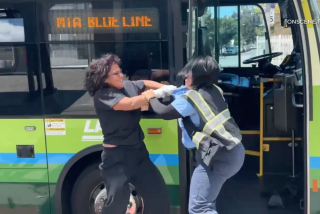Fear and Trembling on the Road? You Bet Your Life
BERMEJO, Bolivia — I could pummel the bus driver.
Andrea and I are careening down a muddy mountain road. Our bus has bald tires, bad brakes and a driver out to prove Charles Darwin wrong.
Nothing slows him down. Not the night fog, the blind curves, the construction detours that jump up at the last second. As he cuts corners, I feel the right rear tire leaving the narrow road. If the front one joins it, we’ll plunge from a cliff hundreds of feet above the Rio Bermejo. I can already hear the screams.
We’re sitting in two of the front passenger seats, and the view through the windshield is like a scene from a horror film. We’re riding from Tarija, in southern Bolivia, to the town of Bermejo, on the Argentine border. The 105-mile trip can take anywhere from six hours to a lifetime.
Here’s the dirty little secret of Third World travel: You often entrust your life to someone you might not trust to watch your luggage. Your perception of risk is warped. You worry about disease, violence and terrorism, but what you should truly fear is any man with a wheel in his hands.
More than 1 million people worldwide die each year in road accidents, most in developing countries, according to the World Health Organization. The Assn. for Safe International Road Travel tells me my chances of dying on the road abroad can be 20 to 70 times higher than in the U.S. It’s a growing problem. By 2020, a Harvard School of Public Health study predicts, road accidents will be the planet’s third leading health burden.
I was vaguely aware of these sobering statistics when we left last January, but not overly concerned. I was a vagabond then, heading for adventure. I’m a superstitious short-timer now, heading for suburbia. My new goal is to return safely to America, where I can stop fretting about buses, taxis and rickshaws and resume worrying about guns.
So what are we doing in this speeding sardine tin? No choice. The transportation dollar goes a long way in poor countries, but it doesn’t buy safety. Competition drives bus tickets down to pennies a mile, leaving little extra for brake fluid. Whatever you spend, you’ll travel poorly constructed, poorly maintained and poorly lighted roads, with poorly paid and poorly trained drivers who flout the poorly enforced traffic laws. And when the inevitable occurs, you’ll wait to be rescued by the poorly funded or nonexistent emergency medical team.
Flying is the obvious alternative, but you miss the sights. Besides, down here they have these pointy things that poke the sky called the Andes. Bolivian aviation gets dicier on the ground. We watched a jet try to land at the Sucre airport only to see it roar off at the last instant when the pilot spotted dogs on the runway. Departure taxes apparently don’t cover the cost of a fence.
I’m not averse to risk in travel. In 1994 I went skiing in Sarajevo, Bosnia-Herzegovina, during the war. Later that year I crossed the U.S. without money. Had I died during these arguably foolish journeys, at least it would have been in the pursuit of unique thrills. That’s more than you can say for a bus crash, which is a mundane, needless, pathetic way to go. If this bus driver kills me tonight, I will surely die again of embarrassment.
Safety may be a luxury in some countries, but caution is free. I understand everyone has a right to a living, even if it’s hauling passengers down gnarly roads in deathmobiles. But with equipment and conditions stacked against them, I don’t get why many drivers ignore the one thing they can control--their own driving habits.
After nearly a year of traveling, I’ve noticed a paradox: the slower a country’s pace of life, the more reckless its drivers. In many places we’ve visited, motorists are the only people moving with any sense of urgency. I want the travel agent to hurry, not the bus driver.
Our young bus driver stops at a roadside cafe. After the break, he returns with a teenage girl who rides shotgun. Our scary bus trip has turned into a first date. The bus driver pops tapes in and out of the cassette player while eating and chatting up the girl. He’s trying hard to impress her. At least he won’t fall asleep. I just hope there isn’t one of those tragedies that brings young lovers closer.
The driver makes change with one hand and steers with the other. His urge to pass every vehicle in front of him is as primal as thirst, hunger, sex. We fishtail around each curve, sliding ever closer to the black edge of the precipice.
I could pummel the bus driver. But I don’t. This is the guy I’ve entrusted with my life.
*
NEXT WEEK: Tips for traveling light.
Did you miss a Wander Year installment? The entire series since it began in January can be found on The Times’ Web site at http://161.35.110.226/travel/wander.
More to Read
Sign up for The Wild
We’ll help you find the best places to hike, bike and run, as well as the perfect silent spots for meditation and yoga.
You may occasionally receive promotional content from the Los Angeles Times.






